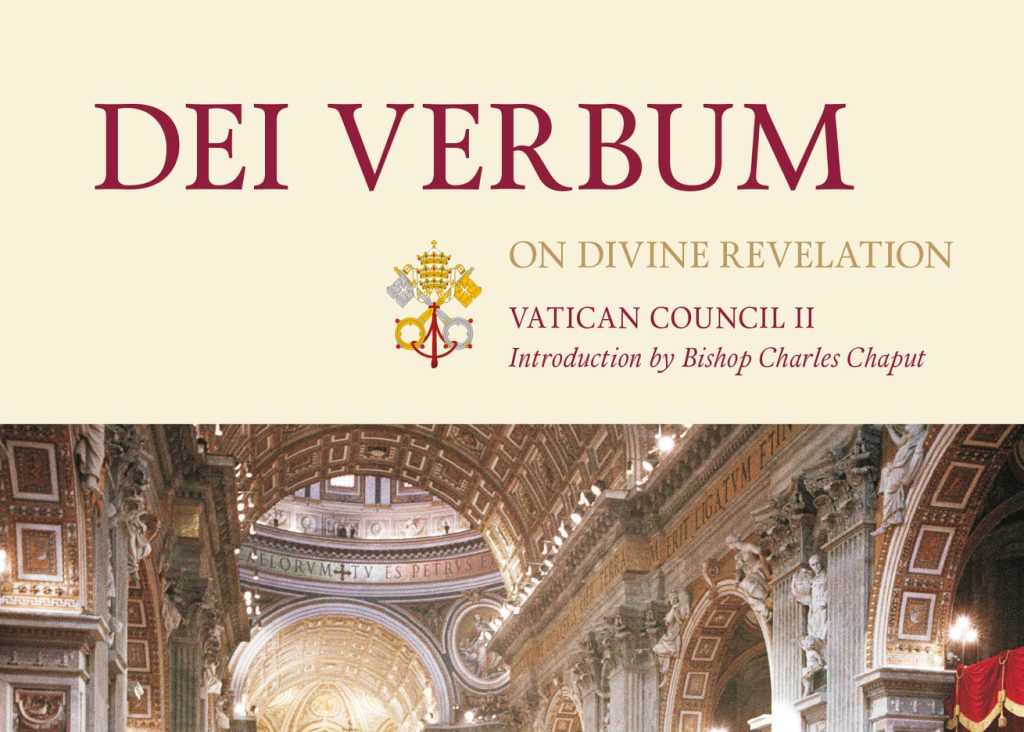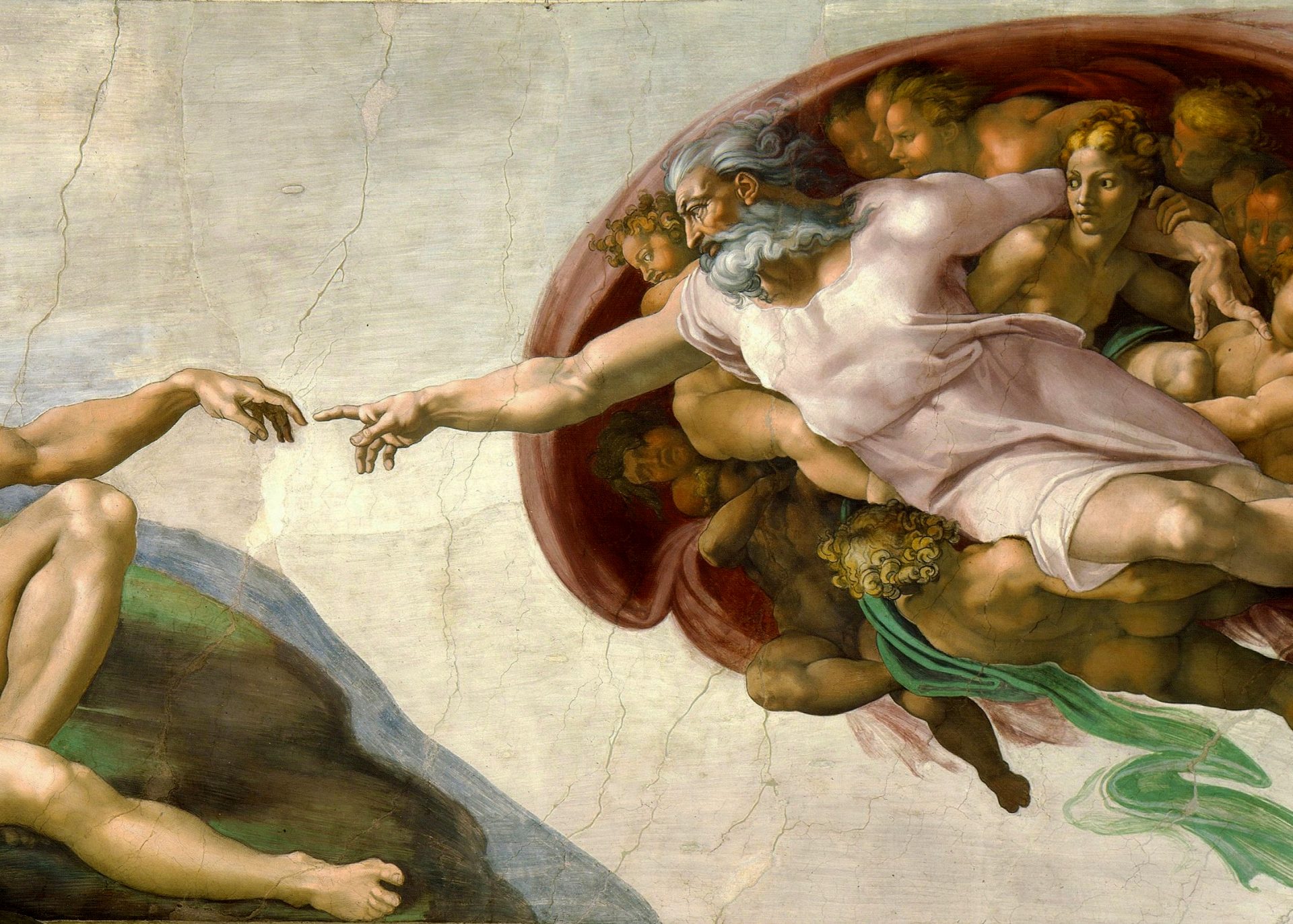How does God talk to us? How does God make Himself/Herself known? How does God relate with us humans? How is the truth about God revealed? In the Bible alone as many Christians tell us? Does he also speak to us in the events of society, in a conversation with a friend, the whispers and beauty of nature?
These questions are answered by the document entitled Dei Verbum (Dogmatic Constitution on Divine Revelation), one of the last documents approved by Vatican II (7 November 1965).
“In His goodness and wisdom God chose to reveal Himself [sic] and to make known to us the hidden purpose of His will by which through Christ, the Word made flesh, humans might in the Holy Spirit have access to the Father and come to share in the divine nature. Through this revelation, therefore, the invisible God out of the abundance of His love speaks to men as friends and lives among them, so that He [sic] may invite and take them into fellowship with Himself [sic]” (DV 2).
This looks like an innocent statement and a taken-for granted fact. But before it was written, there were endless controversies that went before it. For a long time, it was considered that the truths of our faith came through “propositions” issued by the Magisterium. Well, to be exact there were two sources of God’s revelation — the bible and tradition.
The “two source theory” came all the way from the times of Reformation. It tried to counter the Protestant’s idea of “sola scriptura” (scripture alone). The Catholics said No! It should be both — Scripture and Tradition. In our intense quarrel with the Protestants, there were even times that Tradition was considered more authoritative than the Bible. Both sources, however, can only be interpreted by the Magisterium as the Church’s teaching body.
The first draft appeared that in Vatican II (On the Sources of Revelation) — the working paper of the future document called “Die Verbum” — which was presented for discussion by Cardinal Ottaviani and his company carried the same framework (the two source theory). This was not accepted by the majority of the Fathers of the Council.
Cardinal Frings of Cologne stood up in protest. For him, the schema is not pastoral, not ecumenical and not theological. He said: “Why speak of two sources of revelation? This is not traditional. Neither the Fathers of the Church nor the Scholastic theologians, not even St. Thomas himself, nor the previous Councils knew anything about this way of explaining our teaching” (Rynne 1963, 144).
After a fierce round of debates on the floor, voting followed on whether to continue the discussion or to recommit it to the drafting Committee. The proposal to recommit won but was not enough to get the needed two-thirds majority so the discussion continued. The next day, in a decisive move, Pope John XXIII made a dramatic announcement: to stop the debates on the schema and ask an expanded committee to revise it for future discussion.
The theological adviser of Cardinal Frings — the young Fr. Joseph Ratzinger, the future Pope Benedict XVI — described the rejected schema as “anti-modern, rigid, full of negations and prohibitions, defensive, engaged in a politics of closure, and condemnatory of modern exegesis.” The bishops asked him and Fr. Karl Rahner, SJ, another theologian-expert of the Council, to help draft the alternative proposal for the Council’s discussion. Their new proposal is to see God’s revelation as “dialogue” — one which we read in Dei Verbum today.
How does God reveal Himself/Herself to us? Dei Verbum’s answer is by dialoging with us, by speaking to us “as friends,” by dwelling among us, by inviting us to be in fellowship with God (DV 2). That is the opening statement of this document.
God related with us first of all as a loving person, neither as dogmatic statements or moral injunctions. If we want to know God, if we want to relate with God, we might as well listen to, converse with, and follow Jesus whom God has sent. Dialogue is the only way to God, the only way to be.
The shift from a “propositional view” of faith to a “dynamic personal relationship” with a revealing God is the main message of Dei Verbum.
It looks obvious to many people today. But for many ordinary faithful then, this is quite a liberating idea. This means that first of all, God’s “revelation” is not about propositions, dogmas, doctrines, uttered by religious authorities that I need to defend the whole of my life. If I don’t believe, I am condemned as a heretic and can go to hell.
No, first and foremost, it is about a God who revealed Godself in Jesus whom I also want to befriend and follow. Christianity is about a God who loves us so much, as to risk dialoging with us, and calling us to a relationship through the person of Jesus. Jesus is the face of God in dialogue with us.
In the new perspective ushered in by Vatican II, even the Scriptures and Tradition are not two sources of revelation but interrelated modes of transmitting God’s message to us. There is only ONE REVELATION — the Word of God — which has been proclaimed through the prophets, incarnated in Jesus, written about in Scriptures and lives on in the life of the Church, in the events of history and in the voices of nature, up to our times.
The Magisterium or “the teaching office is not above the word of God,” Dei Verbum insists, “but serves it, teaching only what has been handed on, listening to it devoutly, guarding it scrupulously and explaining it faithfully in accord with a divine commission and with the help of the Holy Spirit, it draws from this one deposit of faith everything which it presents for belief as divinely revealed” (DV 10).
Ratzinger later wrote in his commentary of Dei Verbum: “The Council desired to express again the character of revelation as a totality, in which Word [Scripture] and Event [Tradition] make up as one whole, a true dialogue which touches man [sic] in his totality, not only challenging his reason but, as dialogue, addressing him as partner” (Ratzinger 1969, 172).
God therefore is not a monologue, a benevolent dictator issuing orders from above. He is a God of dialogue. It follows that Ratzinger’s option then was a dialogical relationship among the pastors and the Magisterium, the exegetes and the theologians, in matters of interpreting God’s Word in our times (Boeve 2011).
I wanted to recall this because one can sense a sign of backtracking in these once radical positions. In a 1985 interview, Cardinal Ratzinger revisited what happened in the Council and said that the rejection of the Schema formulated by Cardinal Ottaviani was “not directed against the doctrine as such but against the inadequate way of expressing it” (Ratzinger 1985, 41). In short, the criticism was not about the substance but the form. In his 1998 memoir, Ratzinger dissociated himself from the voices which radically rejected the schema at that time (Ratzinger 1998, 121-29).

Beyond these controversies in high places, what practical thing do we get out of this seemingly high theological debate?
First, if there is anything that Dei Verbum wants to tell us, it is dialogue. If God is a God of dialogue, so must be the Church. Let me ask: how is dialogue practiced in the Church? I am not yet thinking about inter-religious dialogue. I will write about it in future articles. But what I have in mind is first of all “intra-ecclesial dialogue.” It makes me sad to see how some sectors of the church “lord it over” certain voices different from its own — expecting only unquestioning obedience and submission. Positions of power have the greatest temptation to monologue, and not to dialogue. Dialogue is a Christian way of life. It means to be open to others who are different from us in cultures, in beliefs, etc. It also means dialogue with nature, with history, other sciences.
Second, some sectors of the faithful refuse to dialogue with the times. They prefer to hark back and insist on outmoded propositions and unchanging traditions, and esoteric texts. They prefer to go back to the “propositional view” of faith rejected by Dei Verbum. Of course, dialogue is difficult and threatening. So, they take refuge and find security in frozen texts and practices that no longer speak to the language of our times. They have forgotten that propositions are part of our language which is also adapting, developing and dialoging with changing contexts.
Tradition is not a dead letter; it is a living reality. And because it is living, it changes with the times. It was not frozen in the Council of Trent. “The tradition that comes from the apostles makes progress in the church, with the help of the Holy Spirit. There is growth in insight into the realities and words that are being passed on.”
Third, closer to home we can also ask how is dialogue lived in our parishes, our religious communities, among our colleague and subordinates? What structures are in place so that dialogue can really take place? Is there a feedback mechanism? This refers to our relations in and outside the church – between bishops and their priests, religious superiors and their members, the parish priests and their parishioners, parish pastoral councils and the BECs, teachers and their students, managers and their employees, parents and their children, etc. Pope Francis wants to recover this in our time by promoting “synodality.” This is not new. This is God’s way of dealing with us. This is how we should deal with one another.
Has dialogue become our way of life? Or we still inhabit an authoritarian and monologic world? Dei Verbum teaches us that God is not a monologue. God is Trinity. Trinity tells us that God’s nature is dialogue.
Dialogue does not only characterize the affairs of God. It should also be the trademark of how we deal with one another and with the world around us.
Father Daniel Franklin Pilario, C.M. is a theologian, professor, and pastor of an urban poor community in the outskirts of the Philippine capital. He is also Vincentian Chair for Social Justice at St. John’s University in New York.







